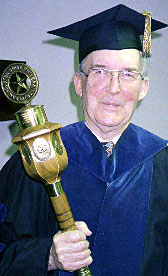
[an error occurred while processing this directive]

Today@Sam | SHSU Headlines | Calendar | Experts | Notices | News Archives
Former 'Mosquito Man'
Now 'Professor Emeritus'
 Look out Texas mosquitoes, especially if you're a rare one. Sam Houston State University's "mosquito man" may be coming soon to your neighborhood swamp.
Look out Texas mosquitoes, especially if you're a rare one. Sam Houston State University's "mosquito man" may be coming soon to your neighborhood swamp.James D. Long, professor of biology and the world's foremost authority on Texas mosquitoes, retired this summer after 40 years as a faculty member and a 53-year association with Sam Houston State going back to his days as a student.
He will not be gone from the campus however, other than for a few mosquito-hunting trips he had not been able to work into his teaching schedule. Upon retirement he was immediately made a professor emeritus, allowing him to continue research efforts using campus facilities.
"I'm really quite excited about it," Long said of his new status. "The 40 years have been very delightful, and I've enjoyed almost every day. Now I'll have time to do some writing and there are several places I've been planning to visit."
Long's research at SHSU has dealt with the distribution, identification and biology of many of the 84 mosquito species reported in Texas, with particular emphasis on a group known as "tree hole mosquitoes." This group breeds in water contained in rot holes in trees.
The status of some of the reported species is uncertain, however, a situation Long plans to remedy. Some species are limited to rather remote locations in Texas--far west Texas, the Panhandle, and the Brownsville area--places he plans to visit.
Long began studying mosquitoes during World War II as a U. S. Naval Reserve hospital corpsman assigned to a malaria control unit in the South Pacific. The research he did later while qualifying for his advanced degrees also dealt with studies of these pesky and sometimes misunderstood creatures.
In 1946 he enrolled as a student at Sam Houston State, earning bachelor's and master's degrees before transferring to the University of Texas for his doctorate. Since returning to teach, research, and to direct research projects by students, he has become known to his students and biology faculty members as "the mosquito man."
He has authored a number of reports and articles dealing with his studies through the years, and plans more during his "retirement." He has also worked with city and state public health officials to determine if mosquitoes capable of carrying human disease occur in significant numbers within specific areas of Texas.
Long has campaigned for the safe use of pesticides, and de-bunked the once-forwarded theory that mosquitoes could spread the AIDS virus. Malaria and other viruses replicate themselves and stay within the mosquito's body, said Long, while the AIDS virus does not.
Long, who has chaired the Sam Houston State biology department, has served twice as president of the Texas Mosquito Control Association and more recently as its treasurer. Every spring since 1970 he has organized that association's workshops throughout the state to provide training for county and city mosquito control workers.
He is a member of a number of other scientific societies, a past president of the Texas Academy of Science and a founding member and organizer of the Texas Committee on Undergraduate Education in the Biological Sciences, a group of senior and junior college teachers concerned with content and format of introductory college biology courses in Texas.
He is also a charter member of the Huntsville Audubon Club, serving as a past officer and president. When he goes into the field, however, his eyes and ears are more attuned to the sights and sounds of mosquitoes than birds.
"There are a couple of species that by their habits could be very easily missed," he said of his planned collection efforts. "It may take several days to find them."
- END -
SHSU Media Contact: Frank Krystyniak
June 16, 1999
Please send comments, corrections, news tips to Today@Sam.edu
This page maintained by SHSU's Office of Public Relations
Director: Frank Krystyniak
Located in the SHSU University Advancement Building
Telephone: (409) 294-1836; Fax: (409) 294-1834
